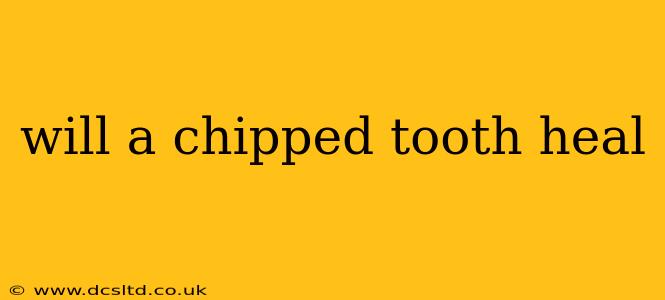A chipped tooth is a common dental injury, often caused by accidents, sports injuries, or even biting down on something hard. While a small chip might seem insignificant, it's crucial to understand that a tooth, unlike a bone, will not heal itself. The enamel, the hard outer layer of your tooth, is non-living and lacks the cells necessary for regeneration. Therefore, a chipped tooth requires professional dental intervention.
How Serious is a Chipped Tooth?
The severity of a chipped tooth depends on several factors, including:
- The size and location of the chip: A small, superficial chip might require minimal treatment, while a large chip exposing the dentin (the layer beneath the enamel) or pulp (the soft inner part of the tooth containing nerves and blood vessels) necessitates more extensive intervention.
- Presence of pain or sensitivity: Pain or sensitivity to hot, cold, or sweet foods and drinks indicates damage to the dentin or pulp, requiring urgent dental attention.
- Bleeding: Bleeding from the injury site signifies deeper damage and should be addressed immediately.
What Happens if a Chipped Tooth is Left Untreated?
Ignoring a chipped tooth can lead to several complications, including:
- Increased sensitivity: The exposed dentin is more vulnerable to temperature changes and acidic foods, leading to discomfort and pain.
- Infection: Bacteria can enter the exposed dentin and pulp, causing infection and potentially leading to an abscess (a pocket of pus).
- Further damage: The chip can worsen over time, leading to larger fractures or even tooth loss.
- Cosmetic concerns: A chipped tooth can affect your smile's aesthetics, impacting self-confidence.
Can a Dentist Repair a Chipped Tooth?
Yes, dentists offer various treatment options depending on the severity of the chip:
- Bonding: For small chips, a dentist can use a tooth-colored resin material to bond the broken piece back together or fill the chip, restoring the tooth's shape and appearance. This is a relatively quick and affordable procedure.
- Veneers: For larger chips or those affecting the front teeth's aesthetics, veneers (thin shells of porcelain or composite resin) can be placed over the damaged tooth, improving its appearance and protecting it from further damage.
- Crowns: If the damage is extensive or involves significant structural compromise, a crown (a cap that covers the entire tooth) might be necessary to protect and restore the tooth's function and shape.
- Root Canal: If the pulp is exposed or infected, a root canal might be required to remove the infected tissue, followed by a crown to protect the tooth.
- Extraction: In cases of severe damage beyond repair, extraction (tooth removal) might be the only option.
Will My Chipped Tooth Heal Naturally?
No, a chipped tooth will not heal naturally. The enamel and dentin are not living tissues, so they cannot regenerate. Any attempt at home remedies won't repair the chip; instead, they could potentially worsen the situation and increase the risk of infection. Prompt professional dental care is essential to manage the damage and prevent complications.
What Should I Do if I Chip My Tooth?
If you chip your tooth, follow these steps:
- Rinse your mouth gently with warm salt water. This helps clean the area and reduce any bleeding.
- Apply a cold compress to the affected area to reduce swelling.
- Find a dentist or emergency dental clinic as soon as possible. Early intervention is crucial to minimize complications and preserve the tooth.
- Save any broken tooth fragments in a clean, damp container or wrap them in a damp paper towel if possible. Your dentist might be able to reattach them.
How Can I Prevent Chipped Teeth?
Preventing chipped teeth involves:
- Wearing a mouthguard during contact sports.
- Avoiding biting on hard objects.
- Practicing good oral hygiene.
- Regular dental checkups.
Remember, a chipped tooth requires professional dental attention. Don't delay seeking treatment; the sooner you address the issue, the better the chances of saving your tooth and maintaining your oral health.
